England v Argentina: Tomas Lavanini red card will help change rugby - Matt Dawson
- Published

2019 Rugby World Cup |
|---|
Hosts: Japan Dates: 20 September to 2 November |
Coverage: Full commentary on every game across BBC Radio 5 Live and Radio 5 Live Sports Extra, plus text updates on the BBC Sport website and app. |
This Rugby World Cup is already a record-breaker.
Not in terms of delivering the first 'three-peat' winners, although New Zealand may well be in a month's time.
Not in terms of a first appearance in the knockout stages for hosts Japan, although that might well be confirmed next weekend.
Instead, Tomas Lavanini's red card against England was the 2019 tournament's fifth, which is more than at any previous World Cup. And we are not yet out of pool stages.
2019 Rugby World Cup's red cards | ||
|---|---|---|
Player | Team | Offence |
John Quill | United States | High tackle |
Facundo Gattas | Uruguay | High tackle |
Ed Fidow | Samoa | Two yellow cards |
Andrea Lovotti | Italy | Lifting tackle |
Tomas Lavanini | Argentina | High tackle |
Some would say that by introducing new guidance for referees on high tackles, external four months before the tournament and criticising officials last week, World Rugby has got its timing all wrong.
They would argue that this crackdown on high tackles is ruining games while the sport is in the spotlight.
For me, World Rugby's timing could not be better.
We have to leverage the stage that rugby has at the moment to bring about a culture change right through the sport.
There is going to be the short-term pain, with controversy, column inches and some unbalanced games - but millions of people around the world are watching these games. This is the chance to teach that lesson about high tackles.
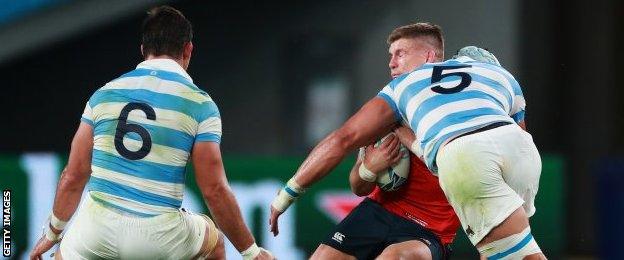
Lavanini (number five) was sent off by Nigel Owens after only 17 minutes for this shoulder to the head of England captain Owen Farrell
When players and officials at junior and mini rugby grounds around the country got together this weekend, they will all have seen that the type of tackle Lavanini put in on Owen Farrell - a shoulder direct to the head with force and no mitigating circumstances - is a straightforward red card.
Decisions like Nigel Owens' in that game will have a dramatic effect on how the game around the world is played and the shop window of a World Cup that will make that happen.
It probably should have happened 10 years ago.
When I was playing it was a different era and mindset. It used to be a badge of honour to get smashed off the ball and get up and get on with it, or to get whacked round the head, or to be targeted with late hits for being a cheeky scrum-half.
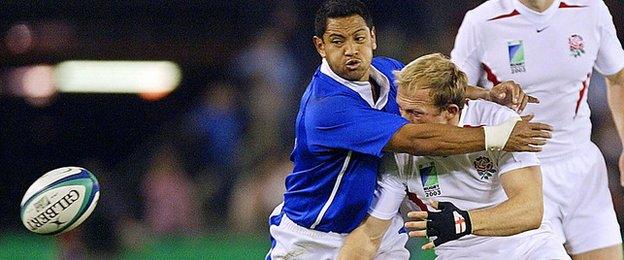
Matt Dawson is tackled by Earl Va'a of Samoa at the 2003 Rugby World Cup
Maybe 90% of the cards dished out today would not have been shown back then.
That mindset is regarded as ridiculous now, rightly so considering the power and intensity these players have, and the dangers involved.
Thankfully, World Rugby has understood that the change has to be dramatic. You can't tinker around the edges with the small print and leave things up to subjective decisions. It has to be a policy shift that floods through the game and into the grassroots.
Too good for their own good?
In some ways, England have been too good for their own good so far in Japan.
After three games of the 2015 tournament they were already out. This time, with a game still to play in the pool, they are already into the quarter-finals.
Back then, they had suffered defeats by Wales and Australia by this stage. Now, they have collected comfortable wins by margins of 32, 38 and 29 points respectively.
That is to England's credit. They have put themselves in very strong positions in matches so far, but very rarely at the World Cup are you going to win the tournament by winning seven straight games by 20, 25 points or more.
There is going to be a game that comes down to the wire, one when they are going to need to crawl over the line.
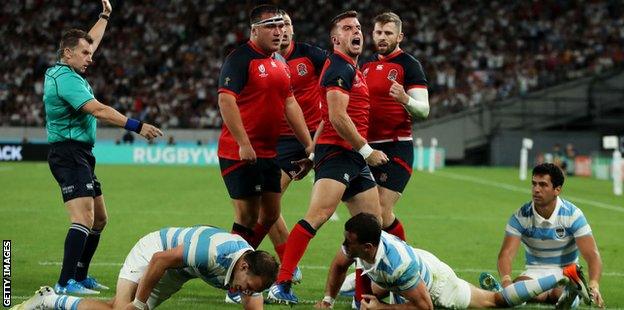
Only once in 24 meetings - a 51-0 win in 1990 - have England beaten Argentina more heavily
Eddie Jones has in the past questioned their ability under pressure. After they wasted a 31-0 lead over Scotland in March - a draw which followed costly second-half lapses against Wales, New Zealand and South Africa in the previous 12 months - the Australian compared his team to a vehicle "with hand grenades in the back".
"Sometimes they go off when there's a lot of pressure. We have a few of them and we've got to get rid of them," he said.
Jones brought in psychologist Corinne Reid to run "honesty sessions" in the run-up to this tournament, external to try and improve that part of their game.
So far, that work has gone untested.
For that reason, I hope that France give them a real test in the second half to force England into fourth or fifth gear, rather than cruising around in third.
England's World Cup | |
|---|---|
22 September | |
26 September | |
5 October | |
12 October | France (09:15 BST) |
'Breakdown bromance'
Although Lavanini's red card led to a strangely disjointed game, there were some real bright spots for England in their win over Argentina.
George Ford dictated the game really well. He was clinical when he needed to be, used the right runners and put the ball into space behind the Pumas defence to gain territory.
It was astute, assured and a step toward the sort of commanding top-level performance that I have wanted to see from him for some time.
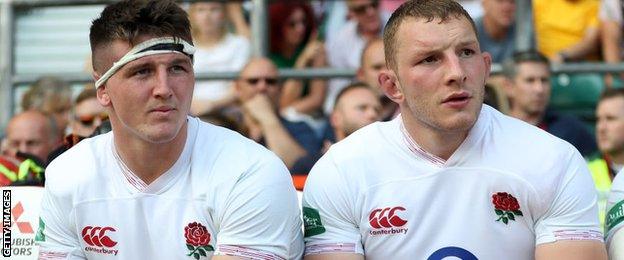
England have won 19 of 25 matches in which Tom Curry (left) and Sam Underhill have played
The combination of Sam Underhill and Tom Curry on either side of the scrum was really good. Like Australia pair David Pocock and Michael Hooper, these two are developing their own little 'breakdown bromance'. They dovetail so well, making great decisions about when to commit and when to stand off.
Maro Itoje went relatively under the radar. Normally he is all bulldozing runs, big hits and standing over players. His performance against Argentina was more unseen, but he looked quietly assured going about his business, making tackles, hitting rucks, guiding driving mauls and stripping players of possession.
It is going to be difficult for Jack Nowell to find a way into the starting XV, with Anthony Watson, Jonny May and Elliot Daly playing well in the back three.
But, as he showed in beating three defenders to get into the corner late on, he is a game-breaker.
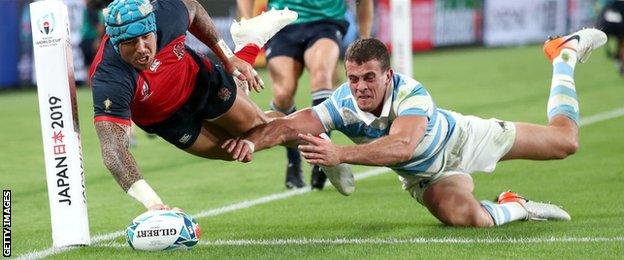
Jack Nowell has 15 tries in 35 games for England
He can create something from nothing and has little downside, with a low error-count and huge work-rate. Added to which he is versatile, covering outside centre as well.
I think against the right opposition, he could go from the start.
On the biggest stage you need certain types of player - "Test Match animals" as my former mentor at Northampton and British and Irish Lions, Ian McGeechan, used to call them.
Nowell always seems to step up. I don't think that will be different at a World Cup.
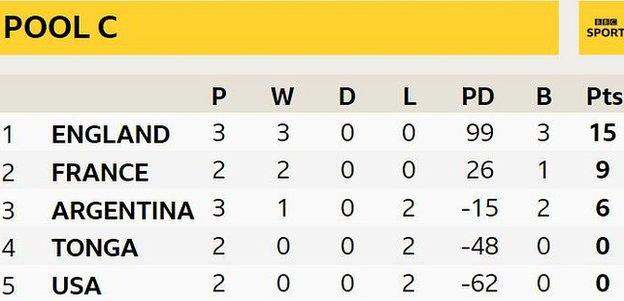
Matt Dawson was speaking to BBC Sport's Mike Henson.